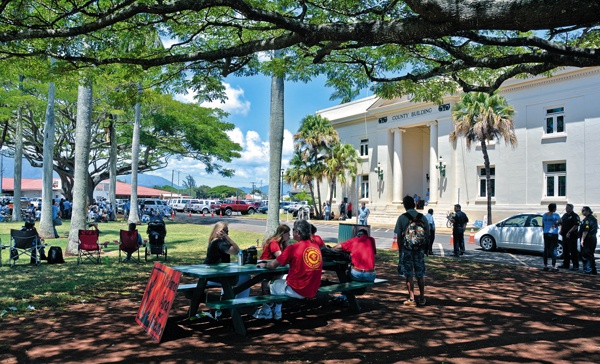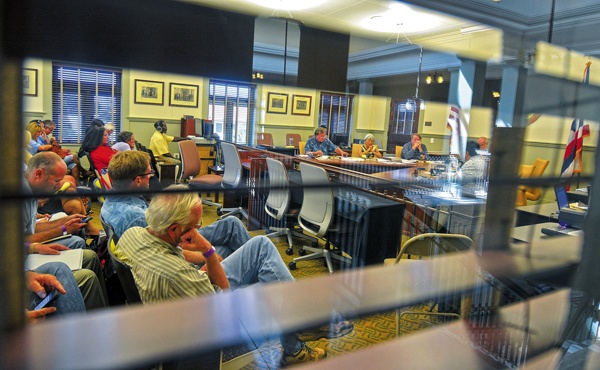LIHUE — A day after a march in Lihue drew several thousand people in support of Bill 2491, the Kauai Economic Development Committee resumed working toward a compromise between the blue shirts, opposed to the bill, and the red shirts, supporting the bill.
“This is supposed to be the land of aloha, we should be working together, united, not fighting against each other,” Westside resident and seed company worker Roberta Puakea said early in Monday’s meeting.
At least 300 seed company workers wearing blue shirts gathered on the lawn facing the Historic County Building throughout most of the day. A few people wearing red shirts attended the meeting.
But if anything, the committee meeting was an indication a compromise won’t be easy.
Bill 2491 requires disclosure of pesticide use and genetically modified organisms, creates 500-foot buffer zones for large ag operations around schools, roadways and bodies of water, and imposes a moratorium on the expansion of GMO fields and open-air testing of GMOs until an environmental impact study is done.
With representatives from four seed companies — Mark Phillipson of Syngenta, Cindy Goldstein of Pioneer, Keith Horton of Dow Agrosciences and Steve Lupkes of BASF — lined up in the council chambers, Committee Chair Gary Hooser asked on several occasions if they were willing to compromise on certain provisions of the bill, only to hear the sound of silence.
“Several people, including many (seed company) employees, have said, ‘can we all work together? Can we compromise?’” he said. “Looking at the various provisions in the bill, let’s start with disclosure.”
Hooser asked if any of the representatives would agree with the pesticide disclosure provisions on the bill, but heard no answer.
“I’ll take the silence as a ‘no,’ is that fair?” he asked.
Phillipson leaned forward and said, “yes.”
“Could any of you disclose to me the amount of general-use pesticide that you use on an annual basis?” Hooser said.
Again, Hooser said he would take the silence as a “no.”
“You can see maybe a little of the frustration that the community must feel, and the doctors in the community don’t know what is being applied either,” Hooser said.
He asked the seed company representatives if they would accept the bill if it were amended to take out the buffer zones near drainage and irrigation ditches, and only focused on living streams that reach the ocean, and also if the buffer zones were taken out for interior roads.
Once again, silence prevailed, and Hooser said he would take it as a “no.”
When Hooser asked if any of the seed companies were conducting open-air testing of experimental pesticides, or if they had experimental use permits as defined in the bill, Goldstein said the descriptive term used in the bill for experimental pesticide is not something she fully understands.
Phillipson said Syngenta currently has federal experimental use permit for pesticides, which involves using pesticides approved for one product on a different crop.
Syngenta farms about 500 acres, with 5 percent, or 25 acres, of the lands dedicated to experimental pesticide use, he said.
Goldstein said Pioneer usually has 50 to 150 acres set aside for experimental pesticide use, but because it’s in between seasons, the company is using about 20 acres for experimental use.
Horton said Dow uses about 20 acres for experimental pesticide use.
Lupkes said BASF has about 5 to 10 acres for experimental pesticide use.
All the seed company representatives said earlier they had no plans to expand. But when asked by Hooser, none of them would support a moratorium on land expansion.
“We’re looking for common ground,” Hooser said. “I think it’s clear that there is an issue in the community and we’re trying to look for a resolution.”
None of the representatives would say they would support a county study on the impacts of the GMO industry.
County Engineer Larry Dill, head of the county Public Works Department, said he would seek expertise with the state Department of Agriculture and the state Department of Health to set up a county division to enforce pesticide use. The division would likely have eight employees, at a payroll of about $800,000.
Councilman Tim Bynum, who co-introduced the bill with Hooser, said the county would not regulate the safety of GMO products — it’s about practices.
Hooser said the DOH has one employee working on Kauai, so one or two people would be enough to enforce buffer zones and pesticide disclosure, he said.
Looking to minimize cost, Hooser said the enforcement cost can be passed on to the ag companies in the form of permitting fees.
Before delving into discussion, the council took testimony from six public speakers; five opposed to the bill and one in support.
Pioneer Safety Coordinator Taryn Dizon said she received death and cancer threats and messages asking for her home address.
“This bill indefinitely divided the island, including friends and family,” she said.






